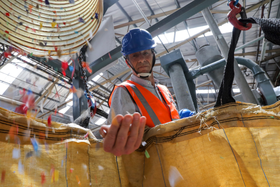
The Alliance to End Plastic Waste has published the first of a series of ‘playbooks’ describing solution models for a circular economy for plastics.
The first playbook covers household waste segregation and maps the steps Alliance project partners have taken to encourage households to separate plastic waste ‘at source’, in projects implemented in Argentina, China, and Indonesia.
The report, developed in partnership with the Boston Consulting Group (BCG), identifies segregation of waste at source as a critical step to reduce upstream sorting cost and ensure recyclers downstream receive clean, pure feedstock, thereby improving value recovery and reducing landfill disposal.
Project Stop in Jembrana, Indonesia, introduced a new waste management system empowering local communities to collect, sort, and sell their recyclable waste.
Pain points addressed
Project Giro demonstrated that there are four main pain points that need addressing.
First, a combination of lack of segregation at source and no infrastructure to accept mixed waste mean there is little possibility for value recovery.
Second, inconsistent or non-reliable collection schedules may cause confusion and apathy towards the municipal waste collection service.
Third, using the same logistics to collect different waste types (recyclables, organic, mixed) can cause distrust as residents presume all waste is treated the same.
Fourth, failure to segregate at source leads to lower quality of recyclates and higher cost at sorting plant.
Lessons learnt
The projects identified five key lessons learnt. Firstly, local government plays an important role, and its commitment and consistency are essential.
Second, awareness campaigns must be ‘human-centred’ to drive behavioural change. Organising events to maintain visibility and using social media alongside in-person outreach are important strategies.
Third, consistent pick-up services and showing that waste streams are kept separate are essential to address the second and third pain points.
Fourth, deploying centralised support teams with access to data-drive, real-time insights can lead to rapid improvements in collection efficiency.
Finally, households want convenience. Ensuring ease of use in the systems deployed is key for household participation.
Critical success factors
The projects identified three key success factors: supportive partnerships, personalised engagement, and testing.
The key partners in driving behaviour change local municipalities and residents, but also waste pickers, small and big waste generators, and educational institutions.
As for engagement, it is important to understand what matters to residents and to use familiar channels to reach them. Alliance projects identified the importance of supplementing introductory conversations with supporting elements, for example starter kits comprising a reusable bag, flyers, and useful takeaway mementos.
To successfully implement a project, it is important to test, iterate and scale. The Alliance found that the pilot programme should be designed by working closely with authorities and residents. Progress must be monitored and adjustments to the local context based on learnings are key before scaling up across a wider area.
“There is a need for solutions that are environmentally beneficial, socially responsible, and economically viable; and therefore, replicable and scalable if we are to advance the transition into a circular economy for plastics,” said Jacob Duer, President and CEO at the Alliance. “The plastic waste challenge is complex and requires a systems evolution from the current take-make-dispose model to a circular one that encourages reuse and recycle, alongside a range of other solutions required to address plastic pollution. To encourage this, we need investments and solutions that improve waste management, support behaviour change, and promote innovation,” he concluded.
Source: sustainableplastics.com








